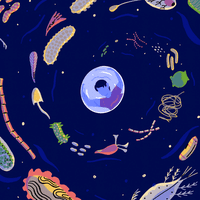
Mar 4, 2022
This week, we flip the Disney story of life on its head thanks to a barrel of seawater, a 1970s era computer, and underwater geysers. It’s the chaos of life.
Latif, Lulu, and our Senior Producer Matt Kielty were all sitting on their own little stories until they got thrown into the studio, and had their cherished beliefs about the shape of life put on a collision course. From an accidental study of sea creatures, to the ambitions of Stephen J Gould, to an undercooked theory that captured the world’s imagination, we undo the seeming order of the living world and try to make some music out of the wreckage. (Bonus: Learn how Francis Crick really thought life got started on this planet).
This episode was reported by Latif Nasser, Matt Kielty, Heather Radke, Lulu Miller and Candice Wang. It was produced by Matt Kielty and Simon Adler. Sound and music from Matt Kielty, Simon Adler, and Jeremy Bloom, and dialogue mix by Arianne Wack.
Special thanks to Alan and Alida Goffinski for giving our chaos musical life in the song at the end of the episode.
Radiolab is on YouTube! Catch up with new episodes and hear classics from our archive. Plus, find other cool things we did in the past — like miniseries, music videos, short films and animations, behind-the-scenes features, Radiolab live shows, and more. Take a look, explore and subscribe!
Support Radiolab by becoming a member of The Lab today.
Citations in this episode
Scientific Papers:
Elisa Beninca, Reinhard Heerkloss, et al, “Chaos in a long-term experiment with a plankton community” Nature (2008)
Hendrik Schubert, Reinhard Heerkloss, et al, “Chaos theory discloses triggers and drivers of plankton dynamics in a stable environment” Scientific Reports (2019)
Books:
Nick Lane, The Vital Question: Energy, Evolution, and the Origins of Complex Life
Francis Crick, Life Itself: Its Origin and Nature
Stephen Jay Gould: Full House: The Spread of Excellence from Plato to Darwin, and The Mismeasure of Man
David M. Raup, Extinction: Bad Genes or Bad Luck?
David Sepkoski, Rereading the Fossil Record: The Growth of Paleobiology as an Evolutionary Discipline